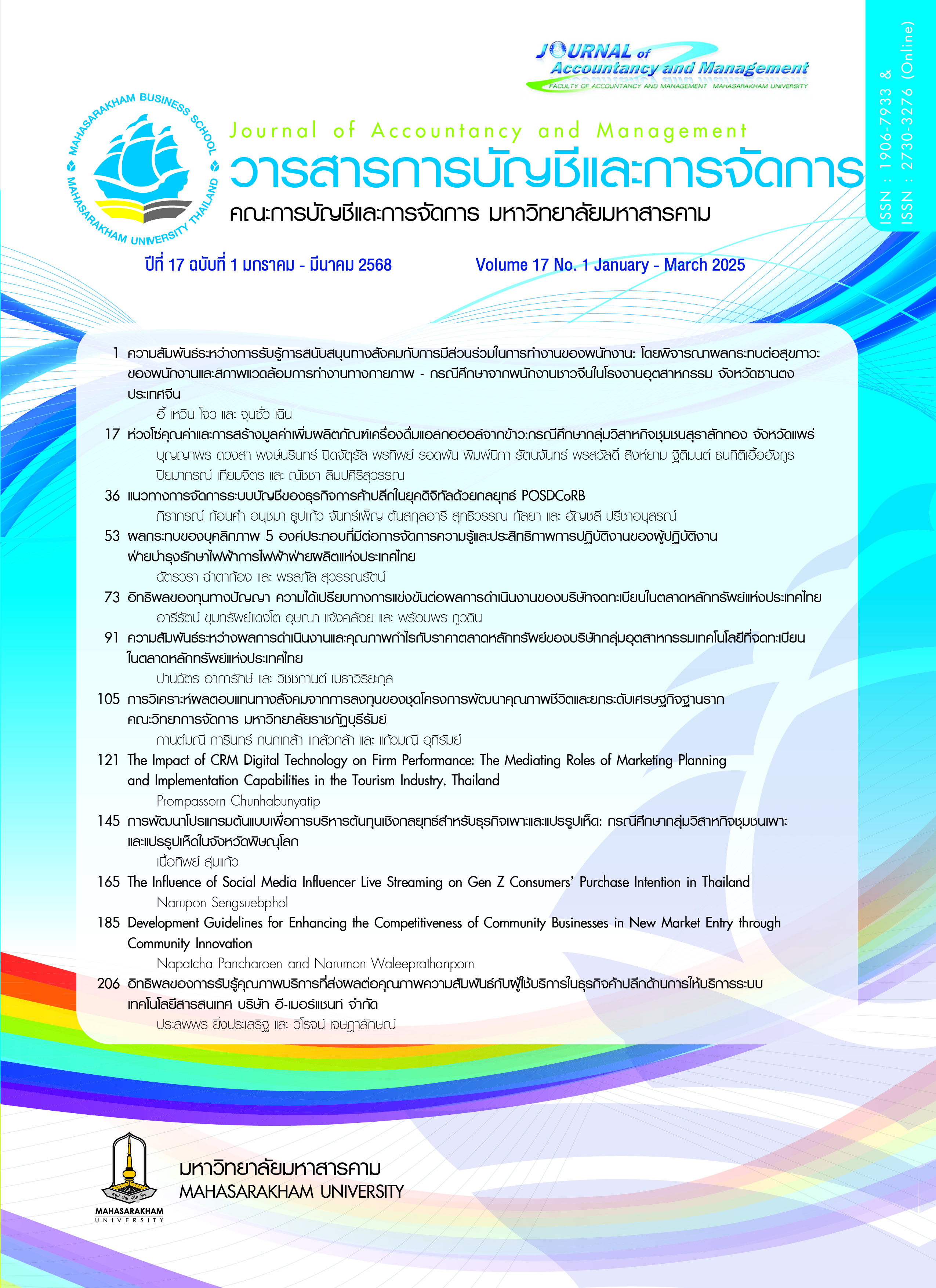Development Guidelines for Enhancing the Competitiveness of Community Businesses in New Market Entry through Community Innovation
Main Article Content
บทคัดย่อ
n/a
Downloads
Article Details

อนุญาตภายใต้เงื่อนไข Creative Commons Attribution-NonCommercial-NoDerivatives 4.0 International License.
บทความที่ได้รับการตีพิมพ์เป็นลิขสิทธิ์ของวารสารการบัญชีและการจัดการ
ข้อความที่ปรากฏในบทความแต่ละเรื่องในวารสารวิชาการเล่มนี้เป็นความคิดเห็นส่วนตัวของผู้เขียนแต่ละท่านไม่เกี่ยวข้องกับมหาวิทยาลัยมหาสารคาม และคณาจารย์ท่านอื่นๆในมหาวิทยาลัยฯ แต่อย่างใด ความรับผิดชอบองค์ประกอบทั้งหมดของบทความแต่ละเรื่องเป็นของผู้เขียนแต่ละท่าน หากมีความผิดพลาดใดๆ ผู้เขียนแต่ละท่านจะรับผิดชอบบทความของตนเองแต่ผู้เดียว
เอกสารอ้างอิง
Braun, V., & Clarke, V. (2006). Using thematic analysis in psychology. Qualitative Research in Psychology, 3(2), 77-101.
Cavite, H. J. M., Kerdsriserm, C., & Suwanmaneepong, S. (2023). Strategic guidelines for community enterprise development: A case in rural Thailand. Journal of Enterprising Communities: People and Places in the Global Economy, 17(2), 284-304.
Charmaz, K. (2006). Constructing grounded theory: A practical guide through qualitative analysis. Sage Publications.
Chienwattanasook, K., Jarinto, K., & Sulong, M. (2023). The development of community enterprise entrepreneurs in the crop production sector for entry into e-commerce. WSEAS Transactions on Business and Economics, 20, 541-548.
Community Enterprise Promotion Committee. (2020). Community Enterprise Act B.E. 2551 .(2008). Community Enterprise Promotion Office.
Department of Business Development. (2019). Community Enterprise Development Plan 2017-2021. Ministry of Commerce.
Drucker, P. F. (1954). The practice of management. Harper & Row.
Glaser, B. G., & Strauss, A. L. (1967). The discovery of grounded theory: Strategies for qualitative research. Aldine Publishing Company.
Ghosh, B. C., Liang, T. W., Meng, M., & Chan, Y. H. (2001). Entrepreneurial success of SMEs: An empirical study in Singapore. The International Entrepreneurship and Management Journal, 17(3), 241-256.
Hallberg, K. (2000). A market-oriented strategy for small and medium-scale enterprises (Vol. 63). World Bank Publications.
Hisrich, R. D., Peters, M. P., & Shepherd, D. A. (2008). Entrepreneurship (8th ed.). McGraw-Hill Education.
Inthachan, P., & Teerathansirikul, L. (2019). The impact of community enterprise on local economic development: A case study of Nonthaburi Province, Thailand. Journal of Community Development Research, 12(2), 120-135.
Johnson, G., Scholes, K., & Whittington, R. (2020). Exploring Corporate Strategy (12th ed.). Pearson.
Jubjone, S., & Lohwanitchai, S. (2019). Problems and analysis of information technology potential to increase marketing opportunities for One Tambon One Product entrepreneurs in Nakhon Ratchasima Province. Journal of Modern Management Science, 12(1), 111-126.
Kaewboonchoo, O., Wongwuttiwat, S., & Suwannakul, D. (2020). Factors affecting the success of community enterprises in Northeast Thailand. Journal of Community Development Research, 13(2), 1-14.
Kotler, P., & Keller, K. L. (2012). Marketing management (14th ed.). Prentice Hall, Pearson.
Kongim, J. (2018). The operation of community enterprise entrepreneurs and a comparison of the operation of community enterprise entrepreneurs in Nonthaburi Province. Academic and Research Journal, North Eastern University, 8(1), 110-121.
Murnpho, S. (2016). A model for developing the potential of community entrepreneurs according to the creative economy concept. Journal of Community Development and Life Quality, 4(2), 195-206.
Nathongkham, P. (2014). Factors affecting the operations of community enterprise groups and a model for developing the operations of community enterprise groups [Doctoral dissertation, Valaya Alongkorn Rajabhat University under the Royal Patronage].
Office of the National Economic and Social Development Council. (2017). National Economic and Social Development Plan No. 12 (2017-2021). Office of the National Economic and Social Development Council.
Patton, M. Q. (2002). Qualitative research & evaluation methods (3rd ed.). Sage Publications.
Peredo, A. M., & Chrisman, J. J. (2006). Toward a theory of community-based enterprise. Academy of Management Review, 31(2), 309-328.
Pickton, D. W., & Wright, S. (1997). SWOT analysis—Its role in strategic and management development in SMEs. Small Business and Enterprise Development Conference. Sheffield University, UK.
Porter, M. E. (1985). Competitive advantage: Creating and sustaining superior performance. Free Press.
Purateera, C., Wantawin, W., & Kaewboonchoo, O. (2009). Factors affecting the management of small and micro community enterprises in the Northeast of Thailand. Kasetsart Journal (Social Sciences), 30(1), 14-23.
Somsamoe, P. (2008). Problems and needs for business potential development of small and medium enterprises entrepreneurs in Chiang Rai Province [Master's thesis]. Mae Fah Luang University.
Somwethee, P., Aujirapongpan, S., & Ru-Zhue, J. (2023). The influence of entrepreneurial capability and innovation capability on sustainable organization performance: Evidence of community enterprise in Thailand. Journal of Open Innovation: Technology, Market, and Complexity, 9(2), 100082
Surin Provincial Administrative Organization. (2018). Surin Provincial Development Plan (2018-2022). Surin Provincial Administrative Organization.
Thipsakunee, S. (2018). The impact of ASEAN Economic Community on Thai SMEs. Journal of ASEAN Studies, 6(2), 121-138.
Tidd, J., & Bessant, J. (2009). Managing innovation: Integrating technological, market and organizational change (4th ed.). Wiley.
Wongadisai, W., Chanchalor, S., & Murphy, E. (2020). Rural community enterprises in Thailand: A case study of participation. World Review of Entrepreneurship, Management and Sustainable Development, 16(3), 276-298.
Wongwuttiwat, S., & Suwannakul, D. (2020). The role of community enterprises in promoting sustainable development in Thailand. Sustainability, 12(10), 4156.
Yin, R. K. (2014). Case study research: Design and methods (5th ed.). Sage Publications.
Zardini, A., Ceesay, L. B., Rossignoli, C., & Mahto, R. (2023). Entrepreneurial business network and dynamic relational capabilities: A case study approach. International Journal of Entrepreneurial Behavior & Research, 29(2), 328-353.


